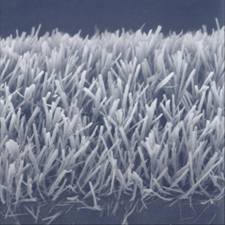
Posted on Saturday, December 12 2009 @ 9:15 CET by Thomas De Maesschalck
Researchers at the Tel Aviv University (TAU) have developed a coating of nanisize peptides that repels dust and water, the discovery may lead to self-cleaning windows and more efficient batteries and solar panels. The peptide forest was discovered by accident while working on a project to find a treatment for Alzheimer's disease.
Both windows and solar panels are less efficient as they get dirty. This is a particularly big issue for solar panels since many of the world's largest solar energy plants are placed in deserts where dust is a very big concern. The researchers on the project include graduate student Lihi Adler-Abramovich and a team working under Prof. Ehud Gazit in TAU's Department of Molecular Microbiology and Biotechnology.
Adler-Abramovich said, "This is beautiful and protean research. It began as an attempt to find a new cure for Alzheimer's disease. To our surprise, it also had implications for electric cars, solar energy and construction."
More info
at DailyTech.
